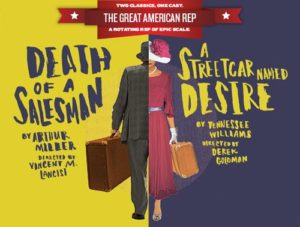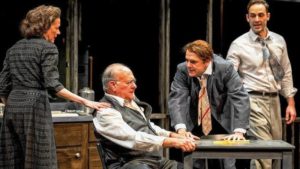 In today’s Wall Street Journal I file the first of two reports from Baltimore’s Everyman Theatre, which is currently presenting Death of a Salesman and A Streetcar Named Desire in rotating repertory. Here’s an excerpt.
In today’s Wall Street Journal I file the first of two reports from Baltimore’s Everyman Theatre, which is currently presenting Death of a Salesman and A Streetcar Named Desire in rotating repertory. Here’s an excerpt.
* * *
Old-fashioned repertory theater, in which a resident ensemble of actors performs a varied group of plays that are mounted in regular rotation, is so much a thing of the past that unless you frequent summer festivals—or major opera houses—you’re not likely ever to have seen it in action. It costs too much for most regional companies even to consider maintaining a permanent or semi-permanent resident acting ensemble, and without the existence of such an ensemble, rotating repertory is impractical to the point of impossibility. Instead we typically get productions in which actors and designers are thrown together on an ad-hoc basis to do shows that run for a month or so, after which a brand-new team of artists is assembled to rehearse and perform a brand-new show.
It goes without saying that such productions can be distinguished—that’s how Broadway works—but it’s also true that the aesthetic unanimity of an ensemble whose members know one another’s styles and minds can immeasurably enhance a show’s total effect. So Baltimore’s Everyman Theatre is doing something very much out of the ordinary by performing Arthur Miller’s “Death of a Salesman” and Tennessee Williams’ “A Streetcar Named Desire,” the two most popular and influential American plays of the ’40s, in rotating repertory….
It makes perfect sense to do “Salesman” and “Streetcar” in this way, not least because the two plays, for all their obvious differences, have much in common: Both are dramas of domestic discontent, part naturalistic and part poetic, that opened on Broadway in groundbreaking productions that were directed by Elia Kazan, designed by Jo Mielziner and accompanied by the incidental music of Alex North. Yet Everyman is, so far as anyone seems to know, the first company in the world ever to present them in rotating repertory, and having recently seen both productions in close succession, I can assure you that to do so is a powerfully stirring experience, one that will stick with you for a long time to come….
 Since “Death of a Salesman” opened first, I’ll put off discussing “Streetcar” until next week and concentrate instead on the considerable virtues of Vincent M. Lancisi’s “Salesman” staging, which is traditional in the best possible way. Mr. Lancisi has steered clear of the high-concept road favored by Ivo van Hove in his recent Broadway revivals of “The Crucible” and “A View from the Bridge.” His “Salesman” is Miller’s “Salesman,” played out with absolute and admirable transparency on a skeletal two-story set designed by Daniel Ettinger that is unmistakably reminiscent (though not slavishly so) of the original Broadway production. The scale of the acting is as modest as that of Everyman’s 250-seat auditorium: Wil Love, who plays Willy Loman, appears to be the shortest man in the cast, and his performance, by turns querulous and ingratiating, is the living embodiment of one of Willy’s most striking lines, “I still feel—kind of temporary about myself.”…
Since “Death of a Salesman” opened first, I’ll put off discussing “Streetcar” until next week and concentrate instead on the considerable virtues of Vincent M. Lancisi’s “Salesman” staging, which is traditional in the best possible way. Mr. Lancisi has steered clear of the high-concept road favored by Ivo van Hove in his recent Broadway revivals of “The Crucible” and “A View from the Bridge.” His “Salesman” is Miller’s “Salesman,” played out with absolute and admirable transparency on a skeletal two-story set designed by Daniel Ettinger that is unmistakably reminiscent (though not slavishly so) of the original Broadway production. The scale of the acting is as modest as that of Everyman’s 250-seat auditorium: Wil Love, who plays Willy Loman, appears to be the shortest man in the cast, and his performance, by turns querulous and ingratiating, is the living embodiment of one of Willy’s most striking lines, “I still feel—kind of temporary about myself.”…
The signal advantage of this approach is that it offsets the fundamental flaw of “Salesman,” which is Miller’s lifelong weakness for pseudo-poetic sentiment. Play it too big and it comes off sounding inflated. Let the hot air out and the result is a different, truer poetry, the kind that arises from simply showing life as it is. That’s what Messrs. Love and Lancisi and their on- and offstage collaborators have done…
* * *
Read the whole thing here.
The trailer for Everyman Theatre’s productions of Death of a Salesman and A Streetcar Named Desire:
The 1966 TV version of Death of a Salesman, starring Lee J. Cobb and Mildred Dunnock, both of whom created their roles in the original Broadway production:
